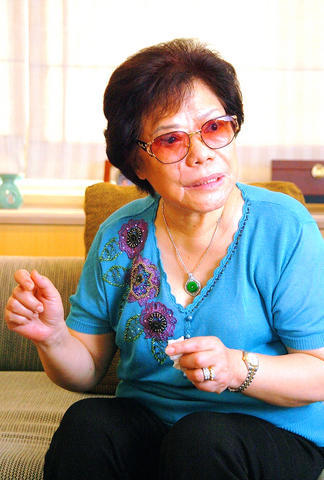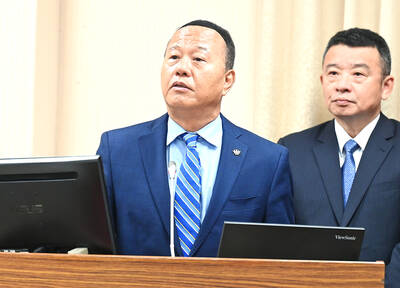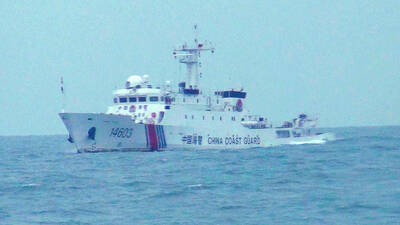It was a Sunday morning when they came to take her father away. Lei Chen (
Lei Mei-lin (雷美琳) was 21 when her father was arrested. She and her family were still asleep when a dozen agents stormed into the house. The family was not surprised because they had been under 24-hour surveillance for more than two years.
Lei Chen, arrested on Sept. 4, 1960, and charged with treason, was incarcerated for nearly two months before Lei Mei-lin could see him. The prison warden took pity on her and told Lei Chen to take a stroll near a window of his office before dinner so that his daughter could see him from the other side of the room.

PHOTO: CHIEN JUNG-FONG, TAIPEI TIMES
"I remember my father was holding a feather fan and walking back and forth outside the window. He was only a foot away, and yet it looked as if he was as far away as the horizon," said Lei Mei-lin, 68, at her Taipei residence yesterday.
Unable to find a job after being blacklisted, she and her husband, Wesley Chin (
Not long after the arrest came the trial. Lei Mei-lin said she did not know what to say to her father but cried when she saw him again. The family was granted only three passes to attend the trial and took it in turns. Lei Mei-lin was outside when the court handed down the verdict.
Declassified documents show that six hours before the verdict was handed down, dictator Chiang Kai-shek (
"The trial was nothing but a show," Lei Mei-lin said. "He [Lei Chen] was a great man, but unfortunately he was born at the wrong time."
Lei Chen, a native of Zhejiang Province, came to Taiwan in 1949 with Chiang's Nationalist troops after they lost the civil war to Mao Zedong's (
Lei Chen, an adviser to Chiang, proposed that the Chinese Nationalist Party (KMT) should conduct democratic reforms in a bid to compete with the communists.
He founded the Free China Journal in Taipei in 1950 with the financial support of the KMT. In the beginning, it was a must-read for the armed forces.
However, as Lei Chen's pro-democracy stance became more apparent, his relationship with Chiang deteriorated. The journal was closed in 1960 following Lei Chen's arrest.
A few days before, Lei Chen's chauffeur was murdered in a staged car accident. The family later discovered that the chauffeur had been spying on Lei Chen for years in exchange for handsome financial reward.
Lei Chen had refused to seek political asylum at the US embassy, insisting he had done nothing wrong.
"He told me that he only bowed to the truth, never to vicious power," Lei Mei-lin said. "He often told me that he was a history-maker and that history would exonerate him."
During his 10 years in jail, Lei Chen wrote a 4-million-word memoir chronicling his life and thoughts on democracy. However, the memoir was confiscated, together with family correspondence.
Lei Chen refused to sign a statement to the effect that he would be "loyal to the party and country," saying he was no longer a KMT member.
Instead, Lei Chen continued to champion democracy after his release from jail. He called for the KMT to abandon its goal of retaking China and for the Republic of China to be renamed the Democratic State of Taiwan-China.
At this time, Lei Chen also worked to unite the elite behind the goal of forming an opposition party.
Chin attributed his father-in-law's liberalism to his having spent 10 years studying in Japan.
"[Lei Chen] was a Mainlander, but he fueled liberalism in Taiwan," he said.
Life was difficult for Lei Chen's family. When Lei Mei-lin was studying at Shih Hsin College (now Shih Hsin University), she once wrote in an exam that she thought her father was the greatest man in the world. An instructor publicly denounced her and called her "shameless," saying everyone knew Chiang was the greatest man in the world.
The instructor threatened to quit if the school refused to expel her. Luckily for Lei Mei-lin, the school, headed by liberal journalist and educator Cheng Sheh-wo (
Lei Mei-lin and her family continued to be harassed by the authorities every time they returned from the US until the Democratic Progressive Party (DPP) came to power in 2000.
In February 2000, President Chen Shui-bian (
At the petition of the family, a fund was launched by Chen in March last year to offer scholarships to underprivileged students. A Web site devoted to Lei Chen's legacy was set up earlier this month on the occasion of his 110th birthday.
Despite the apologies offered by former KMT Chairman Ma Ying-jeou (
"I don't think I'm a good Catholic because I can't forget what they did to my father and my family," she said.
She emphasized, however, that her resentment was against the Chiangs, not the KMT.
Although she is largely apolitical, Lei Mei-lin said she might have joined the DPP had it been formed earlier. The party had done a lot for her family, she said.
Looking ahead, Lei Mei-lin plans to focus on the educational fund set up in her father's name. A second fund based in California will be up and running next year. Lei Mei-lin said the fund would be managed for 15 to 20 years by her two sons and then declared a charity.

VIGILANCE: The military is paying close attention to actions that might damage peace and stability in the region, the deputy minister of national defense said The People’s Republic of China (PRC) might consider initiating a hack on Taiwanese networks on May 20, the day of the inauguration ceremony of president-elect William Lai (賴清德), sources familiar with cross-strait issues said. While US Secretary of State Anthony Blinken’s statement of the US expectation “that all sides will conduct themselves with restraint and prudence in the period ahead” would prevent military actions by China, Beijing could still try to sabotage Taiwan’s inauguration ceremony, the source said. China might gain access to the video screens outside of the Presidential Office Building and display embarrassing messages from Beijing, such as congratulating Lai

Four China Coast Guard ships briefly sailed through prohibited waters near Kinmen County, Taipei said, urging Beijing to stop actions that endanger navigation safety. The Chinese ships entered waters south of Kinmen, 5km from the Chinese city of Xiamen, at about 3:30pm on Monday, the Coast Guard Administration said in a statement later the same day. The ships “sailed out of our prohibited and restricted waters” about an hour later, the agency said, urging Beijing to immediately stop “behavior that endangers navigation safety.” Ministry of National Defense spokesman Sun Li-fang (孫立方) yesterday told reporters that Taiwan would boost support to the Coast Guard

BOOST TO SPORTS? The Executive Yuan said that the amendment was introduced to attract professionals to Taiwan, and increase the incentives for naturalization The Legislative Yuan yesterday passed on third reading an amendment to the Nationality Act (國籍法) that would reduce the minimum residency period required for highly skilled professionals to apply for naturalization from three to two continuous years, with a minimum of 183 days in Taiwan each year. The 183-day requirement does not apply if an eligible applicant has lived legally in the territory of the Republic of China for more than five continuous years. Taiwan’s professional basketball leagues are expected to benefit from the amendments, which would allow them to recruit more players from overseas. Prior to the passage of the amendment, the

Germany sent two warships to the Indo-Pacific region on Tuesday in a bid to strengthen its military presence in the region amid rising tensions between China and Taiwan and over the disputed South China Sea. Those tensions were putting pressure on the freedom of navigation and free passage on trade routes, Defence Minister Boris Pistorius said at the northern German navy base in Wilhelmshaven. Some 40% of Europe’s foreign trade flows through the South China Sea. “Looking the other way, showing no presence in the Indo-Pacific in support of the international rules-based order, that’s not an option for Germany,” he told reporters before